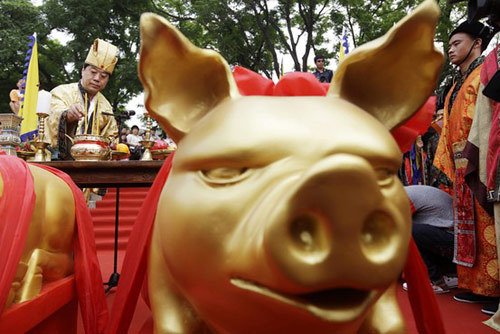公务员盼加薪被爆骂:他们不配涨工资(双语)
中国官员盼加薪惹争议
 When it comes to corrupt Chinese officials, you get what you pay for
When it comes to corrupt Chinese officials, you get what you pay for查看原文
Chinese officials can’t get any respect these days. And they probably don’t deserve a pay bump, either。
That was the sharp reaction of at least 20,000 internet users who body-slammed a suggestion made last week by a representative to China’s annual “Two Sessions” that the salaries of government officials need to increase。
He Xiangjiu, a delegate from the China Writers Association to the Chinese People’s Political Consultative Conference, was the one who made the proposal. “Most junior-level civil servants work diligently with an intense workload,” He argued, “but they have a particularly low monthly salary, not unlike the income of migrant workers。”
Proponents of a pay raise have argued that making officials’ salaries competitive with the private sector would help China attract better-qualified civil servants while also reducing incentives for corruption–especially if those salaries are publicized. Indeed, low salaries are one of the chief complaints officials have when asked to comment on Chinese President Xi Jinping’s anti-corruption push。
But it’s still a tough sell to a skeptical citizenry in China. Many Chinese believe that the official salaries earned by bureaucrats are meaningless, because, in their view, even the well-paid ones loot public money and use government funds for personal use. Many critics of He’s proposal wondered why more money should be given to immoral cadres intent on supplementing their incomes anyway。
Others were equally dismissive, with one blogger noting that everyone knows that civil servants enjoy “a variety of benefits from being in high positions,” and for many bureaucrats, “work is nothing more than being idle, reading the newspaper, clean their offices, and wait for work”。
Another annoyed post claimed that if civil servants wages were as low as those of migrant workers as He says, that the government should be more concerned about the latter, not the former。
Censors let frustrated netizens slap He Xiangjiu around—a sign that Party heavyweights weren’t thrilled about underwriting even this minor attempt to help out their lower-level comrades. In fact, the Party line at first was that government officials were not paying enough attention to why many citizens were furious with them。
As one Party commentator wrote, “while [the responses do] express some irrationality, that may show the true sense of the mood。” Cadres, the commentary stated, “need to get caught up to the state of public opinion…for the sake of less misunderstanding and to make progress towards more productive discussions with the public。”
But not everyone in the Party feels that way。
For example, a sharply-worded commentary from Beijing Evening News that appeared on the website of People’s Daily blamed the response the absence of requirements for civil servants to reveal how much they make. The way forward, the essay insisted, “is to require the [civil servant] system to ensure transparency…for the more transparent, the more able [authorities will be able] to dispel the doubts of the public。”
In other words, the onus is on the government for not making information available and officials held accountable。
He Xiangjiu agreed with that latter view, as he said in the wake of the public reaction that “officials are public figures; they should accept social supervision。” He noted that he has disclosed his own financial situation (a monthly salary of 4000 yuan, or roughly $650, after taxes) but meekly conceded, “under the current system my declaration is not yet fully open to the public for viewing。”
How likely is a pay raise? The same day that He’s proposal broke into the open, a high-ranking CPPCC Committee chair stated that, “taking into account China’s national conditions,” neither he nor the masses would approve of increasing officials’ salaries. Yet the following day, a high official in the administrative apparatus overseeing the civil service in China indicated that pilot studies of the feasibility of a pay adjustment for civil servants were continuing。
By the end of the weekend, a separate government webpage appeared, with leading delegates debating the merit of pay raises。
It’s encouraging that such a robust discussion on the practical issue of pay could occur at this highly scripted legislative gathering。
But the fact that there’s resistance to a simple pay raise points to a major dilemma that the Xi leadership faces: How do you tackle corruption when there’s so little transparency of official salaries and assets and when Party credibility itself isn’t on the increase?
The “Two Meetings” probably don’t have the answer, but at least they’ve asked the question。
(By Russell Leigh Moses)
查看译文
中国的官员们现在得不到一点人民的尊敬。而且他们可能也不配涨工资。
当上周中国两会代表提出公务员[微博]工资需要上涨时,20000多名网友做出激烈回应,他们狠狠地批评了这一言论。
何香久(音)是政协委员,他来自中国作协,是提出上述议案的人士之一。他指出,许多底层公务员工作勤恳,工作量也很大,然而他们的月薪却很低,和农民工的收入不相上下。
支持公务员工资上涨的人士表示,如果公务员的工资和一些私营企业看齐的话,就能吸引更多更有能力的人加入,并且降低腐败的可能,尤其是在工资被公布的情况下。的确,当被问起习近平主席的大力打击腐败时,官员们常常抱怨他们过低的收入。
但是对于充满怀疑的中国普通老百姓而言,这远远不能使他们信服。许多中国人认为公务员所挣取的官方收入是毫无意义的数字,因为在他们看来,即便是那些收入很高的人也会掠夺公共的财富并且把政府资金作为私用。批评何香久的人士认为,既然这些不道德的官员们热衷于通过不良渠道增加自己的收入,我们为什么还要给他们加工资呢?
还有一些人对此表示鄙视。有一位博友指出,大家都知道公务员们“在高高的位置享受着一系列的福利”,而且对于许多官员而言,“工作就是发呆、看报、打扫办公室,同时等待着工作”。
还有一些愤怒的帖子指出,如果公务员的工资真的像何香久所说和农民工那样低,那么政府担心的应该是农民工,而不是公务员。
网络审查也使得失望的网民们能够批评何香久的言论。这是党领导者发出的一个信号,对于这些帮助底层官员的小举动,他们并不是很开心。事实上,党一开始就很关注政府官员们没有对为什么老百姓的愤怒引起足够的重视。
这就像一位党评论员写的那样,当官员说出一些不合理的话时,老百姓们就会表达出他们真实的情绪。他指出,官员们需要紧跟民声,那样会减少和老百姓间的相互不理解,并且可以通过与公众更有成效的对话来推动进步。
党内也并不是所有人都同意公务员加薪。
比如说,人民网上转载了北京晚报上一篇措辞严厉的评论文章,文章中指责了对于公务员收入公开要求的回应缓慢。与此同时,文章进一步指出,我们需要要求公务员系统更加透明,因为系统越透明,公众的怀疑也就会越少。
换句话来说,责任就是政府没有把相关信息公开,而官员也要对此负责。
何香久对于后者的观点表示认同。在公众的激烈回应之后,他表示官员们代表了公众的形象,他们也应该接受公众的监督。他指出他已经公布了自己的财产状况(月收入税后为4000元人民币,相当于大约650美元)。不过他也谦和地指出,在目前现有的系统下我公布的数据也没能充分地公之于众。
涨工资有多大可能呢?在何香久提议公之于众的同一天,一位政协高级委员指出,考虑中国国情不论是他还是中国老百姓都不会同意增加公务员的收入。但是第二天,一位监管中国公务员的政府机构高级官员指出,关于公务员收入调整可行性的初步研究还在进行中。
在周末,在另一个政府网站上,两会代表们正热烈讨论着工资上涨的好处。
在高度照本宣科的两会期间,对于工资这样实际问题的激烈讨论是很鼓舞人心的。
但是现实是,简单加薪的阻力指向了习近平领导的新政府所面临的一个主要窘境:当政府官员的工资和财产这么不透明,当党的公众信服力没有增加的情况下,该如何反腐倡廉呢?
正在召开的两会可能没有答案,不过至少他们已经提出了问题。
(译者 timduncan21 编辑 丹妮)
- 奶茶妹被爆恋京东掌门:哥大真实面目(双语)2014-03-12 18:34
- 爆笑作文:老外这么写中国高考作文(双语)2014-03-12 16:03
- 双语:马航就MH370失联事件媒体声明(十三)2014-03-12 15:23
- 《神夏》卷福期待转型:我不是高智商(双语)2014-03-12 15:17
- TED精彩演讲:坠机让我学到的三件事(双语)2014-03-12 15:09
- 老虎伍兹开球失手 连续两次击中球迷(双语)2014-03-12 11:11
- 双语:美国夫妇自家花园发现千万金币(图)2014-03-12 10:55
